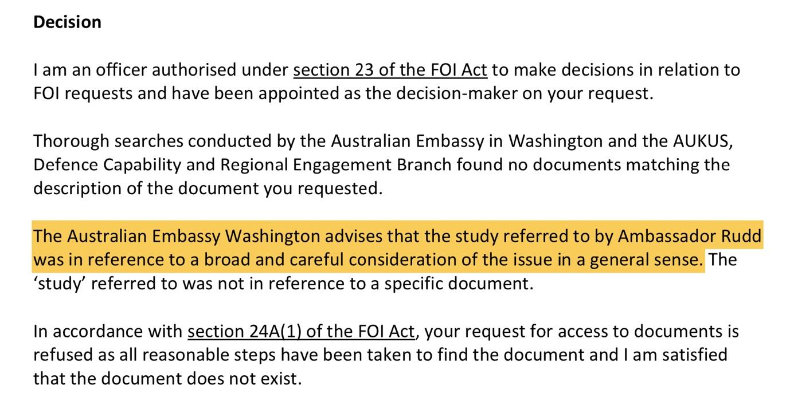While Australian taxpayers are pouring $4.7B into the US submarine industrial base as part of the AUKUS deal, there is scant detail on how the money is spent. But Kevin Rudd has studied it closely. Or has he? Rex Patrick asks.
When Australia’s Ambassador to the United States and former Prime Minister Kevin Rudd did a radio interview about AUKUS with Hugh Hewitt, MWM thought it prudent to carefully analyse what was being said.
Australians have gifted $4.7B to the US to prop up and expand the US submarine industrial base so that the US might – and it’s a big might – be able increase their submarine build rate from 1.4 subs per year to 2.3.
The 2.3 is the magic number to ensure the US Navy is comfortable enough to transfer its much-needed submarines to the Royal Australian Navy while maintaining its own fleet capacity.
But to my knowledge, and I pay close attention to these things, there are no details in the public domain on how the Australian money will be spent; just lots of articles in New England papers saying their submarine shipyards are on a big recruitment drive. There are also press releases from local US politicians saying how happy they are with the inflow of cash into their shipyards.
So I was curious to hear Ambassador Rudd say:
“But when I look at the numbers – and we’ve done a big careful study of this, because we’re spending our money on this – there is already evidence of a full set of apprenticeship schools now emerging in Newport News, and in Groton, Connecticut. We see the increased throughput of boats going from only one per year to an average of 1.3, 1.4 per year.
So we have some confidence that, when you throw in the additional American investment and our [USD] $3 billion as Australia into the base, that by the time you get to 2028, 2029, we should be back in the territory producing two boats a year and perhaps even earlier.”
A “big careful study”. Wow! I had to get my hands on that. So, I put pen to paper and made an FOI request in the following terms: “I seek access to the study of the United States submarine industrial base referred to by Ambassador Kevin Rudd in his interview with Hugh Hewitt Show on the Salem Radio Network on 3 April 2024.”
After the usual wait, I received a formal decision, which left me stunned.
Not quite that big and careful
It turns out there is no study. Now, that’s not to say that Kevin was telling a porky pie. After all, he’s a former diplomat, twice Prime Minister and now ambassador. I’d attempt to explain how he didn’t lie, but it’s probably best if I just let the Washington Embassy do that.

Australian US Embassy FOI response.
So, there’s no consolidated, comprehensive study that underpins the commitment of billions of taxpayers’ dollars to the US shipyard industry.
I don’t doubt that our embassy in Washington and departments back in Canberra have examined various aspects of this, but the absence of a core analysis pulling together all aspects is quite remarkable.
Given that the initial political decisions on AUKUS, by both the Coalition and Labor, were taken without the benefit of such an assessment, it does look like there’s been a disinclination since then to look too closely at the deeply troubled state of US submarine construction projects.
I guess this all ties in with the revelation, extracted by Senator David Shoebridge at the last Senate Estimates, that there’s no clawback of our $4.7B if the US doesn’t deliver.
Tom and Demi
Defence’s management of AUKUS reminds me of that scene from the movie ‘A Few Good Men’ in which Demi Moore looks at Tom Cruise and offers caution: “My feeling is that if this [project] is handled in the same fast-food, slick-ass ‘Persian Bazaar’ manner with which you seem to handle everything else, something’s gonna get missed.”
The quote is spot on for our Defence Department and AUKUS, except that in ‘A Few Good Men’, Tom Cruise goes on to win his case. I’m pretty sure, on AUKUS, that’s not going to be the case for Australia.
Join our Team! AUKUS foreign expenditure sinkhole blows out to $12B … already
Rex Patrick is a former Senator for South Australia and, earlier, a submariner in the armed forces. Best known as an anti-corruption and transparency crusader, Rex is also known as the "Transparency Warrior."

